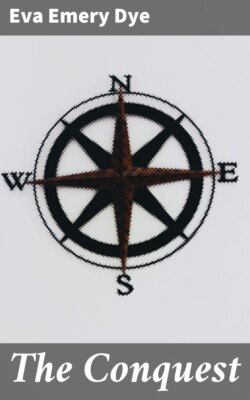Читать книгу The Conquest - Eva Emery Dye - Страница 17
На сайте Литреса книга снята с продажи.
XIII
THE KEY OF THE COUNTRY
ОглавлениеTable of Contents
"The Falls is the Key of the Country. It shall be my depot of supplies. Here will I build a fort. A great city will one day arise on this spot." And in honour of the King who had helped America, Clark named it Louisville.
Axes, hammers, and saws made music while Clark's busy brain was planning parks and squares to make his city the handsomest in America. But, ever disturbing this recreation, "Detroit" was in his soul. "Public interest requires that I reside here until provision can be made for the coming campaign."
"Since Clark's feat the world is running mad for Kentucky," said the neighbours in Caroline. Through all that Autumn, emigrants were hurrying down to take advantage of the new land laws of Virginia.
"A fleet of flatboats!" shouted the workmen at the Falls. Down with others from Pittsburg, when the autumn rains raised the river, came Clark's old comrade, John Floyd, and his brothers and his bride, Jane Buchanan. One of those brothers was Isham Floyd, the boy drummer of Vincennes.
"I, too, shall build a fort," said John Floyd to his friends, "here on Bear Grass Creek, close to Louisville."
Still emigrants were on their way, when a most terrific winter set in. Stock was frozen, wild beasts and game died. The forests lay deep with snow, and rivers were solid with ice.
The cabins of Louisville were crowded, the fort was filled with emigrants. Food gave out, corn went up to one hundred and fifty dollars a bushel in depreciated continental currency. Even a cap of native fur cost five hundred dollars.
The patient people shivered under their buffalo, bear, and elk-skin bedquilts, penned in the little huts, living on boiled buffalo beef and venison hams, with fried bear or a slice of turkey breast for bread, and dancing on Christmas night with pineknot torches bracketed on the walls.
"Did you not say the conquerors of Vincennes waded through the drowned lands in February?" asked a fair one of her partner at the dance.
"Yes, but that was an open winter. This, thank God, is cold enough to deter our enemies from attempting to recover what they have lost."
"But Colonel Clark said the weather was warm?"
"Warm, did you say? Who knows what Clark would have called warm weather in February? The water up to their armpits could not have been warm at that time of year."
The spring waters broke; a thousand emigrants went down the Ohio to Louisville. And carcasses of bear, elk, deer, and lesser game floated out of the frozen forests.
During the June rise more than three hundred flatboats arrived at the Falls loaded with wagons; for months long trains were departing from Louisville with these people bound for the interior. Floyd's fort on the Bear Grass became a rendezvous; the little harbour an anchorage for watercraft.
"We must establish a claim to the Mississippi," wrote Jefferson to Clark. "Go down to the mouth of the Ohio and build a fort on Chickasaw Bluff. It will give us a claim to the river."
While Clark was preparing, an express arrived from Kaskaskia—
"We are threatened with invasion. Fly to our relief."
Without money save land warrants, without clothing save skins, depending on their rifles for food, Clark's little flotilla with two hundred men set down the Ohio, on the very flood that was bringing the emigrants, to clinch the hold on Illinois.
"I have now two thousand warriors on the Lakes. The Wabash Indians have promised to amuse Mr. Clark at the Falls." De Peyster, the new commandant at Detroit, was writing to General Haldimand at Quebec. Even as Clark left, a few daring savages came up and fired on the fort at Louisville.
"She is strong enough now to defend herself," said Clark as he pulled away.
Colonel Bird, working hard at Detroit, started his Pottawattamies. They went but a little way.
"Ugh! Ugh! Ugh! Long Knives coming!" Pell-mell, back they fell, to be fitted out all over again.
"These unsteady rogues put me out of all patience!" exclaimed the angry Colonel Bird. "They are always cooking or counciling. Indians are most happy when most frequently fitted out."
"Such is the dependence on Indians without troops to lead them," sagely remarked De Peyster. "But without them we could not hold the country."
"It is distressing," wrote Governor Haldimand, "to reflect that notwithstanding the vast treasure lavished upon these people, no dependence can be had on them."
"Amazing sum!" he exclaimed when the bills came in. "I observe with great concern the astonishing consumption of rum at Detroit. This expense cannot be borne."
However, the Pottawattamies sharpened their hatchets and, newly outfitted, set out for the rapids of the Ohio.
"Bring them in alive if possible," was the parting admonition of De Peyster, warned by the obloquy of Hamilton. Vain remonstrance with four hundred and seventy-six dozen scalping knives at Bird's command!
From every unwary emigrant along the Ohio, daily the Delawares and Shawnees brought their offerings of scalps to Detroit, and throwing them down at the feet of the commander said, "Father, we have done as you directed us; we have struck your enemies."
The bounty was paid; the scalps were counted and flung into a cellar under the Council House.
And De Peyster, really a good fellow, like André, a bon vivant and lover of books and music, went on with his cards, balls, and assemblies, little feeling the iron that goes to the making of nations.
"Kentuckians very bad people! Ought to be scalped as fast as taken," said the Indians.
